

Entra nella squadra e
premiati
Accedi a nuove funzionalità, notizie e annunci su FM prima di chiunque altro. Ricevi informazioni esclusive e premi incredibili riservati ai membri.
Registrati a FMFCSei già un membro?

We’ve detected that your browser is in English, click the button below to go to the dedicated English version of the Football Manager website.
Go to English site
Hemos detectado que tu navegador está en español. Haz clic en el botón de abajo para ir a la versión del sitio web de Football Manager en este idioma.
Ir al sitio web en español
Nous avons détecté que votre navigateur est en français, cliquez sur le bouton ci-dessous pour vous rendre sur la version en français du site internet de Football Manager.
Allez vers le site en français
Tarayıcınızın dilinin Türkçe olduğunu belirledik. Football Manager web sitesinin Türkçe versiyonuna gitmek için aşağıdaki düğmeye tıklayın.
Türkçe sitemize gidin
Abbiamo rilevato che il tuo browser è in italiano, clicca sul pulsante qui sotto per andare alla versione italiana del sito di Football Manager.
Vai al sito italiano
Wir haben erkannt, dass Ihr Browser auf Deutsch eingestellt ist. Klicken Sie auf die untere Schaltfläche, um zur deutschen Football Manager-Seite zu gelangen.
Zur deutschen SeiteAggiungilo subito alla lista dei desideri per ricevere gli avvisi sul lancio direttamente nella tua casella di posta.
Quando una carriera in Football Manager non va come previsto, viene naturale prendersela con qualcosa o con qualcuno. Ne abbiamo viste e sentite tante sui nostri forum e sui canali social, da chi sostiene che il gioco sia scriptato a chi è convinto che l'IA ottenga sempre i sorteggi più favorevoli nelle coppe.
Pur rispettando le opinioni di tutti, si tratta di semplici luoghi comuni legati al funzionamento del gioco. Football Manager è da sempre un titolo complesso, con migliaia di decisioni alla base di ogni partita, e i singoli risultati o una serie di brutti infortuni non sono mai causati da un solo fattore. In questo articolo vogliamo sfatare 10 dei principali luoghi comuni su Football Manager.
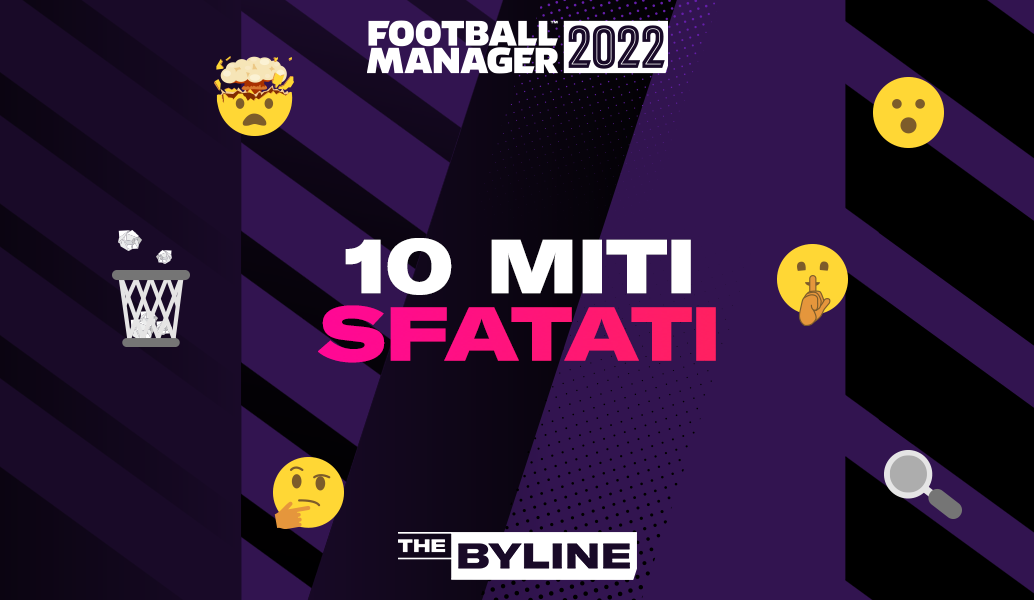
While a 10-game unbeaten streak may have given way to six without a win, no good tactic becomes bad overnight. The reasons for your results changing can be varied and often have nothing to do with the tactic itself. It could be that your team statistically overperformed in your opening games and your winless run is merely a levelling off to where your team should realistically be.
Personnel changes can also often have an impact. Bringing in a raft of new signings will disrupt your team’s Tactical Familiarity, while general fatigue during the season means that sometimes your players have off days.
Remember too that in the same way that you can scout the opposition, the opposition are scouting you too - so they may have found an issue in your tactic for them to exploit. While the tactics of the Football Manager AI are partly based on overall reputation, they'd be foolish not to look at your recent form and league position to dictate their approach. Whatever the reason for a few poor performances, it’s highly unlikely that your tactical approach has stopped working altogether.
Anche se a una striscia di 10 risultati utili consecutivi ne è seguita un'altra di sei partite senza vittorie, questo non significa che sia colpa della tattica. I motivi che portano a questo cambio di risultati possono essere diversi e spesso non hanno nulla a che vedere con la tattica adottata. Potrebbe darsi che la tua squadra si sia comportata meglio del previsto nelle prime partite e che la serie senza vittorie fotografi più da vicino quello che è il suo reale valore.
Anche le modifiche allo staff possono portare spesso a delle conseguenze. Inserire in squadra diversi volti nuovi potrebbe danneggiare gli equilibri tattici, così come la stanchezza accumulata durante la stagione potrebbe far rendere i giocatori al di sotto delle proprie possibilità.
Ricordati inoltre che così come tu studi gli avversari, anche loro possono fare lo stesso con te, quindi è possibile che abbiano trovato un punto debole nella tua tattica da sfruttare. Anche se le tattiche dell'IA di Football Manager si basano in parte sulla reputazione generale, sarebbe da sciocchi per gli avversari non tenere conto dei tuoi ultimi risultati e della tua posizione in classifica per scegliere l'approccio migliore alla partita. Qualunque sia il motivo alla base di alcune prestazioni sottotono, è decisamente improbabile che il tuo approccio tattico abbia smesso di funzionare all'improvviso.
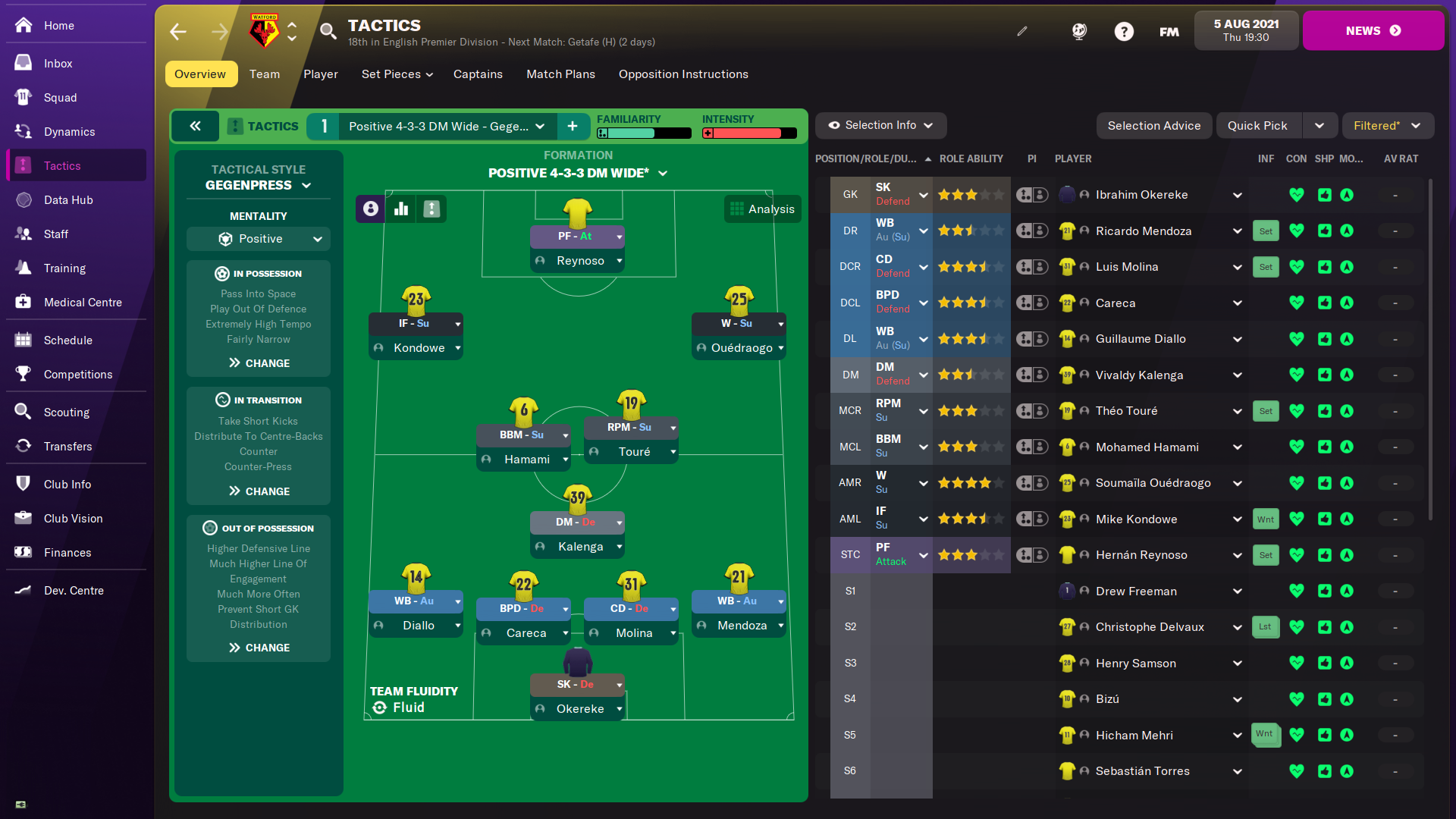
Lo diciamo una volta per tutte: è impossibile che il gioco possa farti perdere. Niente ti impedisce di vincere ogni partita e ogni competizione a cui partecipi in Football Manager.
La verità, come dimostra la storia, è che non esistono squadre imbattibili. A volte si può perdere dominando e altre subendo. Questo è il calcio. Esiste la possibilità che tu non vinca anche se fai tutto alla perfezione. È la maledizione di ogni allenatore: hai il controllo della squadra ma non puoi controllare tutto ciò che accade durante una partita.
In ogni partita di Football Manager vengono prese centinaia di migliaia di decisioni influenzate da parecchi fattori. Tutto alla fine conta, dall'impatto degli attributi nascosti, come la Continuità e le Partite importanti, sulla prestazione di un giocatore, fino a qualsiasi modifica tattica e agli uomini in campo durante la partita, passando per l'altitudine alla quale si gioca e il viaggio per raggiungere la sede del match. Tutti questi fattori significano che ogni incontro fa storia a sé e che non esistono risultati scritti.
Come prima cosa, va sottolineato come spesso si tenda a esagerare quando si parla di infortuni. Se hai disputato appena quattro settimane di gioco in una sessione di FM e ti sono capitati quattro infortuni, è normale che possano sembrarti troppi. Tuttavia, potresti non averne avuto nessuno nelle sei settimane precedenti. Quattro infortuni in un periodo di 10 settimane non è un numero esagerato se ci pensi bene, soprattutto nei periodi della stagione più densi di impegni.
I dati precisi sugli infortuni, soprattutto quelli più lievi rimediati in settimana che non impediscono comunque ai giocatori di scendere in campo, non sempre sono resi pubblici dai club nella realtà. Da quello che sappiamo, il numero di infortuni che si verificano in FM è equivalente, o addirittura inferiore in certi casi, a quello nella realtà. I dati a nostra disposizione sono inclusi nel centro medico per fornire una previsione sul numero di infortuni stagionali. Usa questo valore come riferimento per confrontarlo con il tuo totale e con quello delle altre squadre del tuo campionato durante la stagione.
Esistono tuttavia diversi modi per provare a prevenire gli infortuni in Football Manager. Per cominciare, gestisci il programma e l'intensità degli allenamenti in modo da non sovraccaricare troppo i tuoi giocatori e consulta il centro medico per scoprire chi ha bisogno di riposare e chi invece è alle prese con ricadute di vecchi infortuni. Affidati poi regolarmente al turnover e sfrutta le cinque sostituzioni concesse in molti campionati.
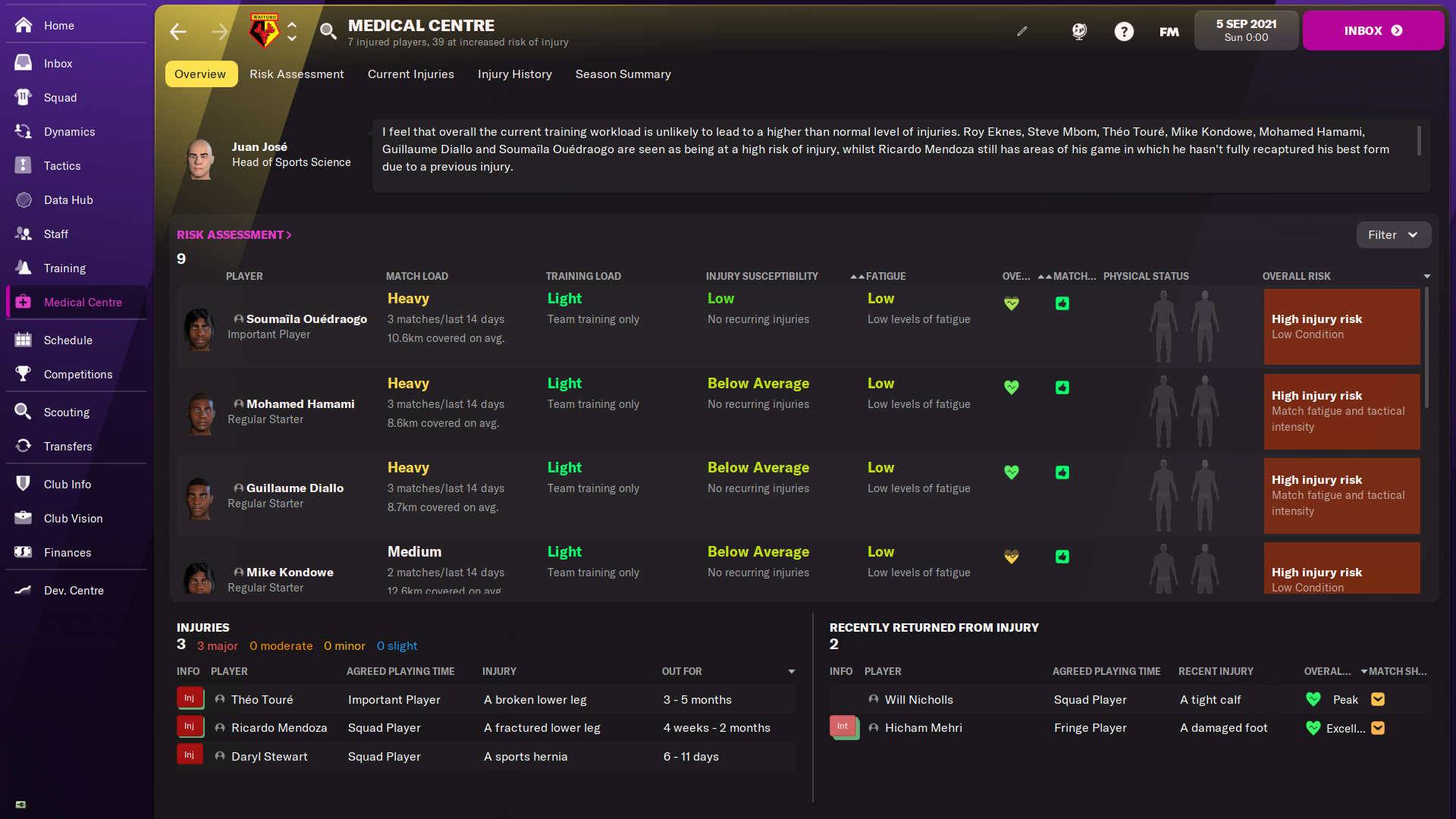
Molte persone credono che il menu Mentalità contenuto nel menu delle tattiche sia una scala progressiva del tipo di calcio che giocherà la squadra. Non è esattamente così.
Le Mentalità rappresentano il tuo approccio generale alla partita o a una certa situazione, ma è soltanto uno degli ingranaggi di un meccanismo più ampio che determina come viene attuata la tua tattica nel motore di gioco. I ruoli e i compiti assegnati ai tuoi giocatori, così come le istruzioni tattiche, influiranno sull'assetto della squadra in campo nella fase di possesso e in quella di non possesso.
Per esempio, un 4-4-2 con compiti offensivi per entrambe le ali si trasformerebbe in una sorta di 4-2-4 in fase di possesso, risultando dunque un assetto particolarmente aggressivo. Assegnando invece compiti difensivi o di supporto a quei giocatori, tenderanno a giocare in maniera più conservativa, indipendentemente dalla Mentalità scelta.
Avere una tattica con diverse istruzioni non è necessariamente sbagliato, aumenta solo le probabilità di ritrovarsi con delle istruzioni incompatibili.
Tutte le istruzioni di squadra interagiscono tra loro, oltre che con la mentalità scelta, i ruoli per i giocatori e con ogni istruzione individuale aggiunta. Per esempio, se chiedi al tuo portiere di passare la palla bassa, ma tieni una linea difensiva molto alta, finirà probabilmente per rinviare lungo con i piedi, perché non avrà compagni vicini da servire. In maniera analoga, se assegni troppe istruzioni individuali a un giocatore, è più facile che questi finisca per confondersi e non capire esattamente cosa ti aspetti da lui.
In generale, nelle prime partite consigliamo di utilizzare un minor numero di istruzioni. Questo ti faciliterà le cose quando cerchi di capire cosa funziona e cosa non funziona con la tattica. In seguito potrai aggiungere e rimuovere tutte le istruzioni che desideri, fino a ottenere una squadra in grado di dominare in patria e all'estero.
Spesso gli utenti sui social e sui nostri forum si lamentano del fatto che ci vogliono 30 tiri per fare un gol, mentre all'IA ne basta solo uno. Ora, questo scenario si verifica con molta più frequenza nella realtà di quanto si pensi. In FM, capita non perché gli utenti e l'IA utilizzano motori di gioco diversi, ma per il mix che si viene a creare tra le tattiche usate.
I giocatori di FM e l'IA hanno a disposizione gli stessi strumenti per creare le tattiche, ma spesso gli utenti esagerano un po' con i moduli e le scelte. Questo tende a creare delle interazioni nascoste, o visibili di rado, con l'IA.
Vale inoltre la pena ricordare che quantità non sempre fa rima con qualità. Potresti aver concluso a rete anche 10 volte nel primo tempo, ma se hai calciato sempre da fuori area, quanti di questi tiri hanno realmente impensierito il portiere avversario? Un xG elevato a volte può essere frutto della somma di tiri poco pericolosi, dunque sta a te come allenatore tenere traccia di quelle occasioni per avere un quadro più preciso della situazione.
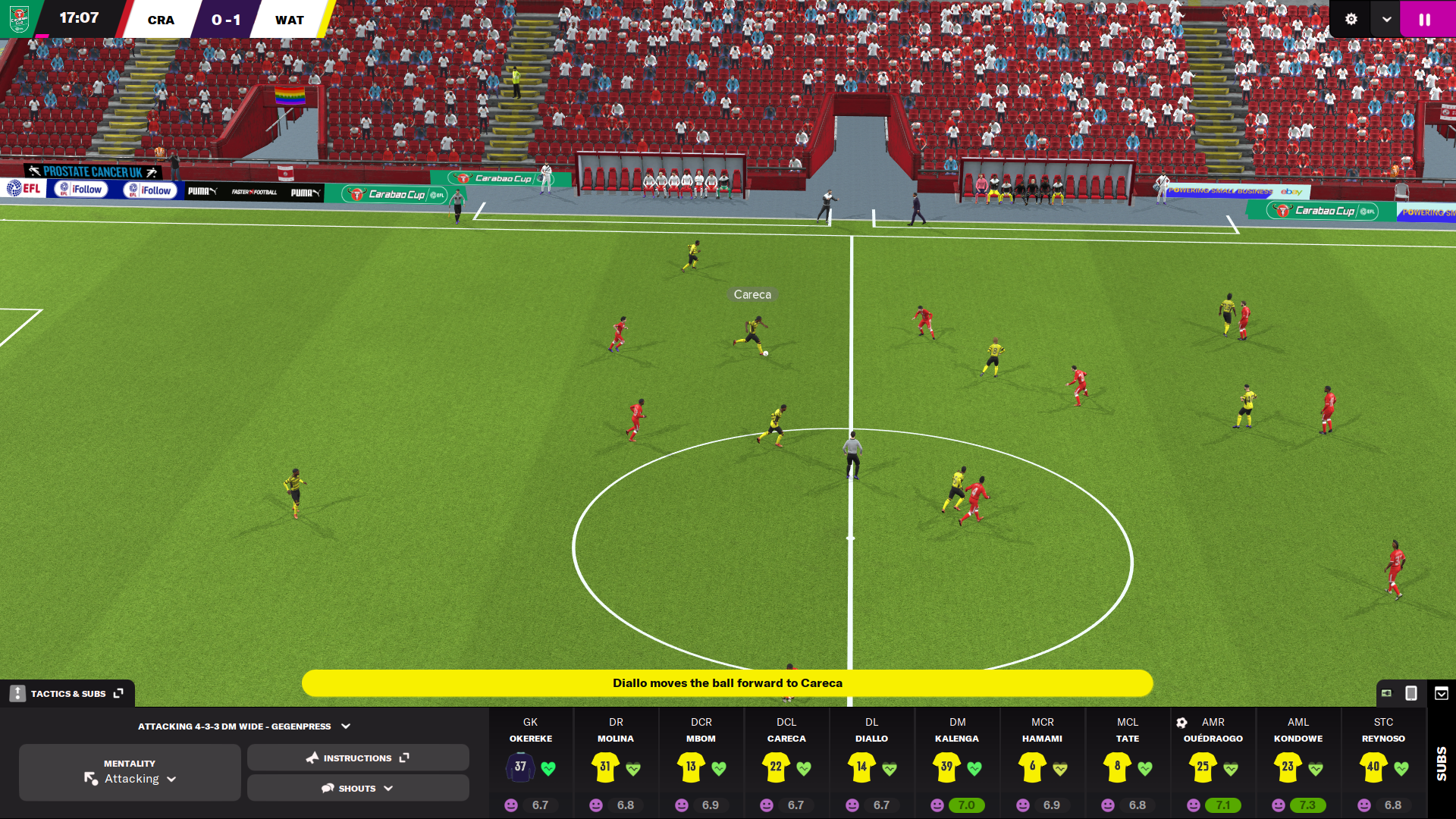
L'invidia per i newgen è un fatto assodato. È vero che certi paesi e squadre sfornano in continuazione nuovi talenti, sia nel gioco che nella realtà, ma ciò non significa ricevere sempre delusioni il giorno dell'ingaggio dei giovani o che tu non possa fare nulla come allenatore per migliorare la qualità dei tuoi newgen.
È un aspetto del quale abbiamo già parlato in precedenza in The Byline, ci limiteremo dunque a riassumere alcuni dei passaggi che puoi seguire. Aggiornare le tue strutture ha un impatto diretto sulla qualità dei tuoi newgen nel corso del tempo, mentre migliorare la natura del tuo staff influirà direttamente sulla personalità di quei prospetti prima che siano disponibili per essere ingaggiati. Assumere un ottimo responsabile del settore giovanile nel 2022 non ti assegnerà immediatamente dei newgen fenomenali. Questa figura ha una maggiore influenza sui giocatori più giovani e più suggestionabili nascosti nel club, dovrai attendere dunque almeno il 2025 per ottenere dei risultati.
Anche con le migliori strutture, staff e infrastrutture, c'è comunque un elemento di casualità legato al giorno dell'ingaggio dei giovani. I talenti della "generazione d'oro" potrebbero palesarsi alla tua prima stagione o non comparire affatto. In fondo, anche questo fa parte del divertimento, no?
In Football Manager, le valutazioni a stelle per i giocatori non sono fisse, ma vengono calcolate in base alla qualità della tua rosa, dei campionati e delle competizioni alle quali prendi parte. Per esempio, un'ala potrebbe essere valutata cinque stelle nella Sky Bet League Two, ma una volta conquistata la promozione nella Sky Bet League One, le stelle scenderanno a tre o quattro.
Inoltre, un giocatore potrebbe ricevere una valutazione elevata solo perché è la tua migliore alternativa in quel ruolo in un determinato momento. Se ne acquisti uno molto più forte, la valutazione iniziale dell'altro molto probabilmente scenderà di conseguenza. Tieni inoltre presente che queste valutazioni non sono assolute o perfette, ma si tratta delle opinioni dei preparatori o degli osservatori sul giocatore.
Sappiamo come funziona... Vedi una valutazione a stelle elevata per l'idoneità al ruolo e inizi subito a modificare la tua tattica per schierare i tuoi giocatori migliori nei ruoli a loro più congeniali e riempire lo schermo di stelle. Questo a volte può creare degli squilibri e impedire alla tattica di funzionare come potrebbe o dovrebbe.
La valutazione a stelle per l'idoneità al ruolo dipende da molti fattori, in particolare quanto il giocatore si trova a proprio agio in quella posizione e quanti punti ha negli attributi principali per quel ruolo specifico.
Spesso però capita che gli attributi richiesti per i vari ruoli di una certa posizione coincidano. Per esempio, studiando gli attributi di un giocatore potresti notare che il suo ruolo ideale è quello di regista avanzato. Questo probabilmente sta a indicare che potrebbe ricoprire in maniera efficace anche il ruolo di centrocampista centrale o di centrocampista totale.
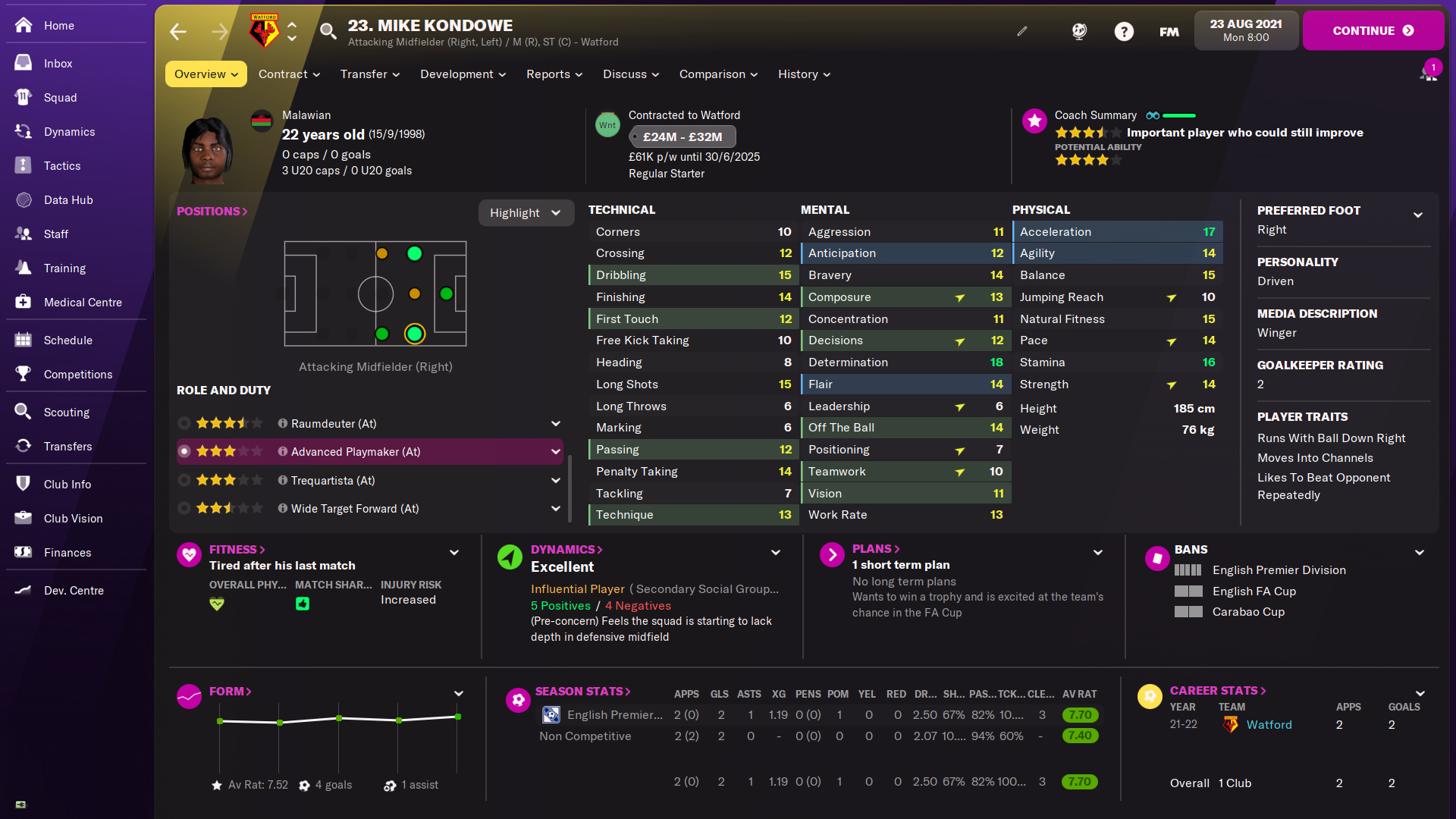
L'aspetto morale viene spesso sottovalutato in molte carriere di Football Manager, ma può fare la differenza tra un'ottima stagione e una deludente.
I giocatori protestano in particolare per lo scarso impiego. Usare le opinioni di squadra per capire cosa si aspettano e cercare di venire incontro alle loro richieste durante la stagione dovrebbe tenerli tranquilli.
In caso di lamentele, ci sono sempre degli strumenti per rimediare. Organizzare riunioni di spogliatoio può avere spesso un notevole impatto sulle prestazioni successive della tua squadra, mentre aggiungere alle sedute di allenamento sessioni per rafforzare il legame tra i giocatori aiuterà a migliorare l'umore e l'unità del gruppo prima squadra.
Speriamo che questo articolo sia servito a sfatare alcuni dei luoghi comuni su Football Manager. La verità è là fuori, se sai dove cercarla. Se non sei sicuro di come funziona qualcosa in FM, consulta la sezione Aiuto e Guide del nostro sito o vai nei forum della community dove puoi metterti in contatto con il nostro team addetto alla community e con moderatori volontari esperti del gioco.
Putting it simply, no, of course the game doesn’t want you to lose. In fact, there is nothing preventing you from winning every match you play and every trophy you compete for in Football Manager.
However, as every team in the history of football has proved, no one is unbeatable. Sometimes you lose in a ‘fluky’ way and sometimes you get outplayed. That’s the way it goes. There’s a chance you’ve done everything right but just don’t win. That’s the curse of the manager; you’re in control of the team but you can’t control everything that happens in a match.
In Football Manager, hundreds of thousands of decisions are made in every match and those decisions are influenced by a host of factors. From the impact of hidden Attributes such as Consistency and Important Matches on a player’s performance to any mid-game tactical and personnel adjustments you make, as well as the altitude you’re playing at and the distance you’ve had to travel for a fixture, everything plays a role. Having so many factors at play means that every match is unique and that no outcome is pre-determined.
To start, it’s worth noting that there is often a recency and memory bias when it comes to injuries; if you’ve just played through four game weeks in a session of FM and experienced four injuries, the idea that there might be too many seems obvious. However, you might not have had an injury for the six weeks prior to that. Four injuries over a 10-week period is not too bad when you think about it, particularly if you’re in a congested part of the season.
Precise injury data from real-world clubs, particularly for slight knocks experienced during the week that players might not miss any games through, isn’t always publicly available. From what we know, injury levels in FM are comparable or even lower in some cases than they are in real life. The data we have is incorporated into the Medical Centre to provide an expected number of injuries in a season – use that for reference when looking at your total and those of other teams in your league during the season.
There are ways to try and prevent injuries in Football Manager, though. Managing your training schedule and intensity to not relentlessly overwork your players is a simple step, as is referring to the Medical Centre to learn who needs a rest and who suffers from recurring injury problems. Rotate regularly and maximise many leagues now allowing five substitutions per game rather than three.

A lot of people seem to think that the Mentality dropdown in the Tactics menu is a sliding scale of the sort of football your team will play and that’s not entirely right.
Mentalities are a byword for your overall approach to a game or a certain situation but they are just one cog in the wider wheel that determines how your tactic plays out in the Match Engine. The roles and duties you give to your players will affect your team’s shape in and out of possession, as will your tactical instructions.
For example, if you were playing 4-4-2 with both wide players on Attack duty, that would look more like a 4-2-4 when you are in possession and so would be very attacking. If those wide players were on Support or Defend, then they would tend to play in a more conservative way, regardless of the Mentality being used.
A tactic with several tactical instructions isn’t necessarily bad per se, it just increases the chances of you having selected instructions that don’t complement each other.
All team instructions interact with one another, as well as the Mentality chosen, the player roles you’ve picked and any individual instructions you’ve added. For example, if you ask your Goalkeeper to Roll it Out but have a Very High Defensive Line, they’ll probably have to kick it every time because they won’t have suitable options available. Likewise, if you give a player too many individual instructions, they’re more likely to get confused as to what exactly you’re expecting from them.
Generally, we recommend starting out with fewer instructions in your opening games. This keeps things simple as you begin to understand how what’s working and what isn’t with the tactic. From there you can add and remove as you see fit until you build something capable of dominating at home and abroad.
We’ve often seen users on social media and our forums say that they feel like they need 30 shots to score once in a game while AI teams only need one. Now, this sort of thing happens much more regularly in real life than people seem to think. In FM, it happens not because FM players and the AI are using different Match Engines but because of the blend between the tactics being used.
FM players and the AI have the same tools at their disposal to create tactics, but human players often go a little offbeat with their shapes and choices. This tends to create interactions they might not see, or see very rarely, with the AI.
It’s also worth remembering that quantity doesn’t always equal quality. You might have had 10 shots in the first half but if they’re all from outside the box, how good have those opportunities really been? Having a high xG can sometimes be an aggregation of low value shots, so as manager it’s your job to keep track of those chances to make sure they’re showing you the whole picture.

Newgen envy is real. While it is true that certain nations and clubs seem to be Golden Boy factories in-game and in real life, that does not mean that you’re consigned to permanent disappointment on Youth Intake Day or that there’s nothing you can do as manager to improve the quality of your Newgens.
This is something we have explored on The Byline previously, but we’ll give you a quick rundown here of some of the steps you can take. Upgrading your Facilities directly impact the quality of your Newgens over time, while improving the natures of your backroom staff will directly impact the personalities of those prospects before they hit the intake screen. Recruiting a great Head of Youth Development in 2022 won’t suddenly give you amazing Newgens in 2023 or even 2024 - their influence is strongest with the younger, more impressionable players hidden in the club's background (think 2025 and beyond).
Even with the best possible Facilities, Staff and infrastructure, there is still an element of chance on Youth Intake Day. That elusive ‘golden generation’ might happen in your first season or might never materialise at all – that’s part of the fun, though, isn’t it?
Star ratings are not calculated on a fixed scale in Football Manager for all players but instead are relative to the quality of your squad and the leagues and competitions you’re playing in. For example, a winger might be considered a five-star player for your team in Sky Bet League Two but when you achieve promotion to Sky Bet League One, they’ll only be three or four.
Additionally, a player might receive a high rating because they are your best option in that position at the time. However, if you make a new signing that’s a considerable improvement, that initial player’s rating is likely to drop accordingly. Also, bear in mind that these ratings are not absolutes or perfect representations as they’re a coach or scouts opinion of that player.
We know what it’s like, you see high role suitability star ratings and immediately start adjusting your tactic to get your best players playing in all their best roles to get a sea of stars on your screen. However, that can often throw out the balance of your tactic and prevent it from working as well as it could or should.
Role suitability star ratings are determined by a few different things; the key things are how natural the player is in that position and how they score for the Attributes relevant to the specific role.
There’s often a broad amount of overlap in the Attributes needed between the differing roles in a certain position, though. So, while studying a player’s Attributes might show that their best position is as an Advanced Playmaker, they will also probably indicate that they would be effective as a Central Midfielder or Box-to-Box Midfielder.

Morale is overlooked in many Football Manager careers but it can be key in making or breaking a season.
Discontent often emerges around playing time. Using squad views to get an understanding of what your team expect and managing that throughout the campaign should ensure that everyone stays happy.
Should heads start to drop, there are tools at your disposal. Staging Team Meetings can often have a profound impact on your team’s subsequent performances, while adding Team Bonding sessions to your Training schedules will help improve the happiness and togetherness of your whole first-team squad.
Hopefully this has helped to dispel some common Football Manager misconceptions. The truth is out there if you know where to look – if you’re ever unsure of how something is working in FM, consult the Help and Guides section of our website or head over to our community forums, where you can engage with our community team and extremely knowledgeable volunteer moderators.


Accedi a nuove funzionalità, notizie e annunci su FM prima di chiunque altro. Ricevi informazioni esclusive e premi incredibili riservati ai membri.
Registrati a FMFCSei già un membro?
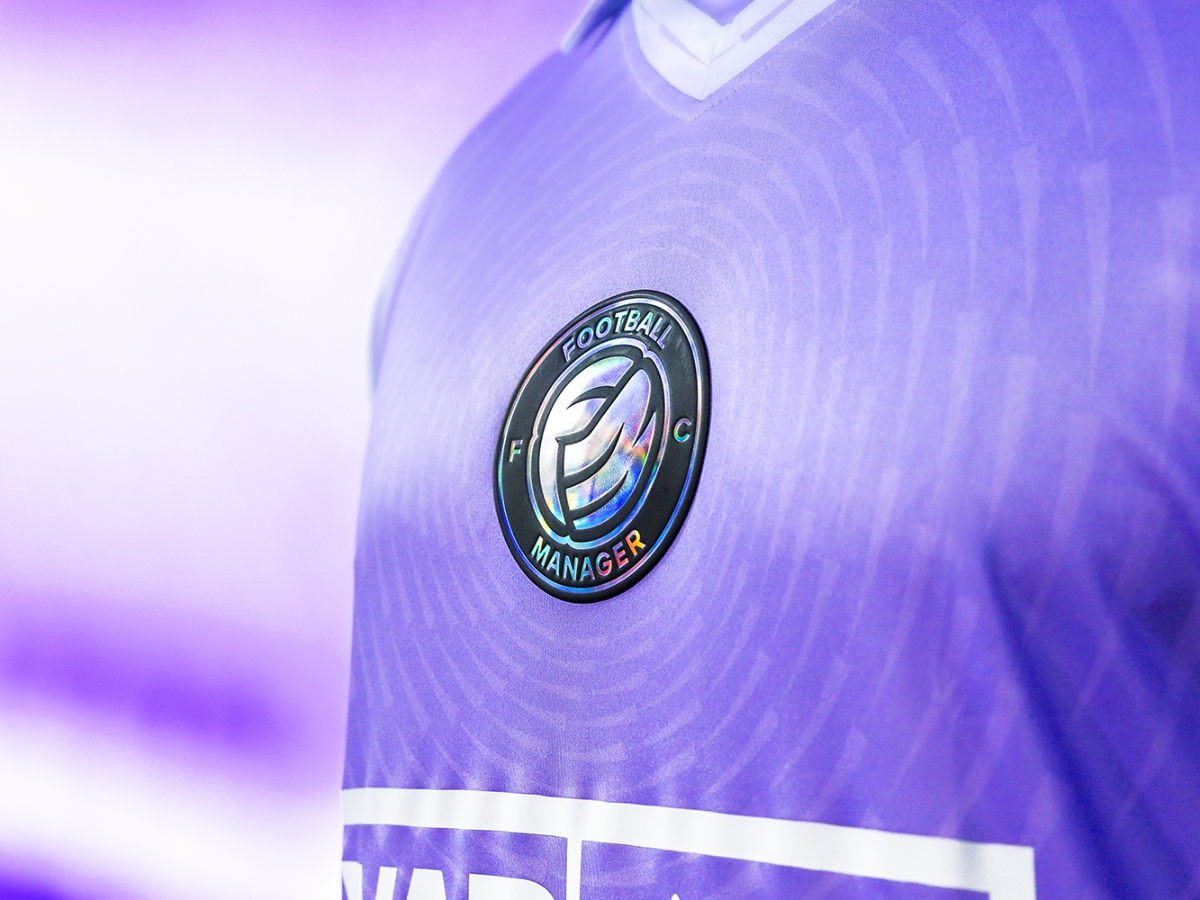
Non perderti nemmeno un momento
Scopri per primo cosa abbiamo in serbo per il futuro! Seguici sui nostri canali social @FootballManager. L'handle è lo stesso su ogni piattaforma.